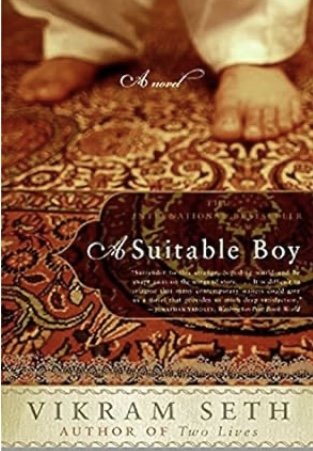A Suitable Boy by Vikram Seth (HarperCollins) ~ Janet Brown
Some books exist as intellectual challenges: War and Peace, Moby-Dick, anything written by Thomas Pyncheon. Others appear to be constructed with only a word count in mind, bizarre exercises that sprawl and meander without discipline. And then there are noble efforts that demand attention, even when readers know this adventure will end badly, leaving them in a state of rage and frustration, mutterings things like “Where was its editor?”
It took Vikram Seth six years to write his 800.000-word novel, A Suitable Boy. A writer who became known for his poetry, he composed his first novel entirely in verse. Even its front cover rhymed: Golden Gate by Vikram Seth. To follow up that literary groundbreaker, Seth essentially broke the art of the novel into jagged little pieces, creating a work that follows an 18th century construct in length while dashing itself to bits against the sheer unwieldiness of 20th century historical events.
Beginning with an ambitious mother and a rebellious daughter, the first sentence promises the sparkle of Jane Austen. “You too shall marry a boy I choose,” the matriarch announces at a lavish family wedding. However Seth is much too original to stick with this overused trope. Setting his novel in 1950, when India is still struggling with the wound dealt by Partition and the dilemma of uniting a feudal society of princely states into a cohesive government, Seth has a multiplicity of competing threads clashing within the first hundred pages, with 1373 more to go. (In its paperback edition, it weighs in at 1473 pages and is around six inches thick. Surprisingly, the binding holds it all together after days of reading.)
Grappling with the intricacies of the caste system, the inevitable clash between Muslims and Hindus, the need for land reform that will strip the Rajas and Nawabs of their fiefdoms, the clash between Westernized “brown sahibs” and rural populists, the transformation of localized economies into a national globalized whole is dizzying enough. Throw in a cast of characters that burgeon into a mob scene and suddenly there are several books in play, all jostling for their own spotlight.
Seth provides a family tree that gives a helpful map for forty-three of his characters, while leaving readers to flounder through at least another sixty. Be warned. Falling in love with any of them is a recipe for a headache that will defy any analgesic. This novel demands its own spreadsheet, or perhaps several. That it was published In 1993, long before Microsoft became a household staple, only proves the thoroughly diabolical nature of Seth’s creative genius.
His characters are enticing, his descriptions vivid, his ear for dialogue is unmatched and untrammeled. In one portion a family that converses in rhymed couplets takes over, in the next there’s a satirical rendition of pompous courtroom speeches. No interchange is too trivial. All of the characters, even a couple of very young children, are allowed full spate.
Somewhere around the nine hundredth page, the clashing plots and the prolix characters blur together into a muddle that defies any form of intelligibility. Early on, Seth compares writing a novel to composing a raag (or raga as it’s known in English), with musical improvisations deviating from the main theme and at last increasing to a climax. Within another hundred pages this process becomes a banyan tree that sprouts and grows and spreads with branches that become trunks or intertwine with other branches. When finally, one hundred pages from the end, a character declares, “I hate long books: the better, the worse,” anyone who has reached this point is ready to stand up and cheer.
For decades, Seth promised a sequel to A Suitable Boy, based upon one of its concluding sentences that echoes the first one of this book. A Suitable Girl proved to be unpublishable and it’s hard not to wish that the same thing had been decided of its predecessor. What began as a suitable novel should have been turned into several slimmer and more digestible pieces of fiction.
